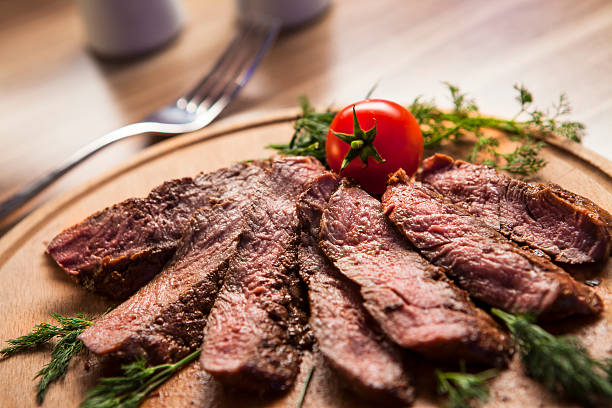When it comes to a nutritious diet, many people envision plates piled high with leafy greens, fruits, and whole grains, while lean steak often takes a back seat due to misconceptions about its health impact. However, when you choose lean steak cuts and consume them in moderation, you can enjoy a variety of health benefits that might surprise you.
Lean Steak Cuts
Before delving into the health benefits, let’s clarify what we mean by “lean steak cuts.” These cuts are typically lower in fat content compared to their marbled counterparts. Some popular examples of lean steak cuts include:
- Sirloin Steak: This lean cut comes from the sirloin section of the cow and is known for its lower fat content.
- Filet Mignon: As one of the most tender cuts, filet mignon is naturally lean.
- Top Round Steak: This cut is often used for roast beef and is another lean option.
- Flank Steak: Although it has a unique texture, flank steak is a lean choice.
- Tenderloin Steak: Similar to filet mignon, tenderloin steak is prized for its tenderness and leanness.
Protein-Packed Goodness
Lean steak is an excellent source of high-quality protein. Protein is vital for the body as it plays a crucial role in various functions, including:
- Muscle Health: Protein is essential for muscle growth, repair, and maintenance. Including lean steak in your diet can help you meet your protein needs and support your active lifestyle.
- Satiety: Protein-rich foods are known to promote feelings of fullness and reduce hunger. This can aid in weight management by helping you consume fewer calories overall.
- Metabolism: The thermic effect of protein is higher than that of carbohydrates and fats, which means your body burns more calories during digestion. This can contribute to a modest boost in metabolism.
Rich in Essential Nutrients
Lean steak offers more than just protein. It’s also a great source of various essential nutrients:
- Iron: Lean steak is rich in heme iron, which is highly absorbable by the body. Iron is essential for oxygen transport in the blood and overall energy.
- Vitamins: Steak is a good source of B vitamins, particularly B12, niacin, and riboflavin. These vitamins play a role in metabolism, energy production, and overall health.
- Minerals: In addition to iron, steak provides zinc, which is crucial for immune function, wound healing, and proper growth.
Heart Health
Contrary to some beliefs, lean steak can be part of a heart-healthy diet:
- Cholesterol Content: Lean cuts of steak contain less cholesterol compared to fattier cuts. Additionally, the cholesterol in food doesn’t have the same impact on blood cholesterol levels as previously believed.
- Saturated Fat: While beef contains saturated fat, choosing lean cuts and trimming visible fat can significantly reduce your saturated fat intake.
- Omega-3 Fatty Acids: Some lean cuts of steak, such as sirloin, contain omega-3 fatty acids, which have heart-protective effects.
- Monounsaturated Fat: Steak also contains monounsaturated fats, the kind found in heart-healthy olive oil.
Blood Sugar Regulation
Protein-rich foods like lean steak can help regulate blood sugar levels:
- Low Glycemic Index: Lean steak has a low glycemic index, meaning it has a minimal impact on blood sugar. This can help stabilize energy levels and reduce cravings for sugary foods.
- Satiety: As mentioned earlier, protein promotes feelings of fullness and can prevent overeating, which can be beneficial for those trying to manage their blood sugar.
- Muscle Maintenance: Maintaining lean muscle mass is important for blood sugar control, as muscle cells are more efficient at using glucose.
Weight Management
Lean steak can be a valuable addition to your weight management efforts:
- Satiety: High-protein foods help you feel full and satisfied, reducing the likelihood of overeating and aiding in weight control.
- Muscle Mass: The protein in lean steak supports muscle growth and maintenance, and having more lean muscle can boost your metabolism.
- Calorie Control: Lean steak is relatively low in calories compared to fattier cuts. Incorporating it into your meals allows you to enjoy a satisfying portion without excessive caloric intake.
Bone Health
Steak provides essential nutrients for maintaining strong and healthy bones:
- Calcium: Although not as rich in calcium as dairy products, steak contains this bone-strengthening mineral.
- Phosphorus: Phosphorus is another mineral essential for bone health, and it’s present in steak.
- Protein: Collagen, a protein in steak, is a building block for bones and connective tissues.
Nutrient Absorption
The iron in lean steak enhances the body’s absorption of plant-based iron sources, such as those found in vegetables and grains. This can be particularly beneficial for individuals following a vegetarian or vegan diet.
Moderation Is Key
While lean steak offers numerous health benefits, it’s essential to consume it in moderation as part of a balanced diet. Consider the following tips:
- Portion Control: Stick to recommended portion sizes, which are typically around 3-4 ounces (85-113 grams) per serving.
- Variety: Enjoy a diverse diet that includes a range of protein sources, including lean meats, poultry, fish, legumes, and plant-based proteins.
- Preparation Methods: Opt for healthier cooking methods such as grilling, broiling, or roasting to minimize added fats and calories.
- Trim Visible Fat: Remove any visible fat from lean cuts to reduce saturated fat content.
- Accompaniments: Be mindful of the side dishes and condiments you choose, as they can significantly impact the overall healthfulness of your meal.
Lean steak can be a valuable part of a healthy diet when consumed in moderation. Its protein content, essential nutrients, and potential health benefits make it a worthy addition to your balanced meals.
